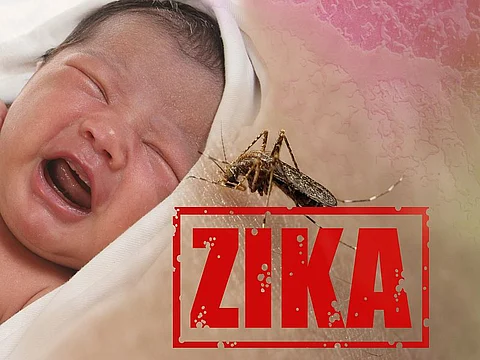THURSDAY, June 22, 2017 (HealthDay News) -- Exposure to the Zika virus in pregnancy can wreak havoc on babies, but diagnosing the infection before birth remains a challenge. Now, there's some good news: U.S. health officials say testing placental and fetal tissue after a child is born can confirm or rule out infection.
Such testing found that only 1 in 10 who were in danger of being infected actually were, and infection didn't automatically mean birth defects, researchers from the U.S. Centers for Disease Control and Prevention reported Thursday.
"Testing of placental tissues from live births can continue to be considered when results of maternal Zika virus testing are not definitive or testing is not performed within the optimal time," said the researchers led by Dr. Sarah Reagan-Steiner, of the CDC's National Center for Emerging and Zoonotic Infectious Diseases.
Zika infection is most often spread by mosquitoes, but can be transmitted during sex. It usually causes only mild symptoms in healthy adults. However, infection during pregnancy can result in serious birth defects, including microcephaly (a smaller-than-normal head), and brain abnormalities.
Doctors need to know which babies to monitor. But current blood tests aren't foolproof, and there's only a short window for accurate detection, the researchers explained in background notes.
Searching for a better method, the new study analyzed results of tissue testing for pregnancy-related Zika infection in all 50 states and Washington, D.C.
"Even though the number of pregnant women who had a Zika diagnosis confirmed through placental testing is low, this type of testing can provide a definitive diagnosis, which can help families and doctors plan the right course of follow-up," the researchers said in the June 22 issue of Morbidity and Mortality Weekly Report, a CDC publication.
Dr. Jennifer Wu, an obstetrician-gynecologist at Lenox Hill Hospital in New York City, said the report highlights the importance of postnatal testing for Zika.
"There is often uncertainty about whether the mother contracted Zika virus during the pregnancy and there are limits to the accuracy of prenatal testing of the mother," Wu explained.
"When the post-delivery testing confirms infection, there must be close follow-up of the [baby]," she added. "Though microcephaly is evident at birth, other more subtle effects of Zika infection may not be known immediately."
Another expert agreed.
"While testing of placental tissue can be useful, this does not tell the whole story," said Dr. Jill Rabin. "Women with positive tests may not have babies with obvious [defects]; nevertheless, their children may subsequently demonstrate functional problems such as difficulty with vision, hearing or developmental delays."
Scientists are "learning more about Zika virus infection as time progresses and diagnostic tests are refined," added Rabin, co-chief of Women's Health Programs-PCAP Services at Northwell Health in New Hyde Park, N.Y.
The CDC researchers found that of 546 live births with possible maternal Zika virus exposure, just 11 percent -- or 60 -- proved positive.
In 81 cases of pregnancy loss where tissues were available for sampling, 22 percent -- or 18 -- tested positive for Zika virus.
And in almost 400 births where an unidentified infection had occurred, testing was able to confirm Zika in 10 percent of babies. Tissue tests also ruled out Zika in another 10 percent of cases where infection likely occurred well before the mother's blood was tested, the researchers said.
The best way to prevent infection is to avoid being bitten by mosquitoes, and to avoid risky sex with someone who may have contracted Zika, experts said.
"Women of childbearing age should avoid traveling areas with high rates of Zika virus, and if they find themselves in these areas, using insect repellent with DEET, mosquito netting, staying indoors and using air conditioners should help reduce the risk," Rabin noted.
More information
For more about Zika, visit the World Health Organization.


